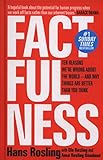Table of contents
Introduction
I read a book, 'FACTFULNESS' as follow.

Factfulness: Ten Reasons We're Wrong About The World - And Why Things Are Better Than You Think
- 作者: Hans Rosling,Ola Rosling,Anna Rosling Ronnlund
- 出版社/メーカー: Sceptre
- 発売日: 2018/04/03
- メディア: ハードカバー
- この商品を含むブログを見る
In this book, customs and skills to understand the world based on data and facts correctly. I extracted some sentences which I was impressed and wrote as memo in this article.
Author
Memo
When you understand statistics, if the difference of values was about 10% or lower than 10%, you should be cautious in concluding based on the difference.
Don't forget that an average hides a variation.
Three factors which stimulate your negative instinct:
- Weird memory
- Biased news
- An atmosphere which you are hard to tell, "It is getting better than before" when the current status has not been good yet.
Two kinds of how to think "Bad" and "It is getting better" should be compatible for understanding the current world.
The more our history is beautified, the more difficult we and people in a next generation reach the facts.
A graph is not always straight. There are many patterns of shape.
Being peaceful gradually is the greatest progress.
This peaceful world is a ephemeral gift for us given by people from former generation.
"Fear" and "Danger" are much different. Feeling fear just looks like there is a risk. On the other hand, a dangerous thing always has a risk. If you concentrated on the fear too much, your effort will turn out of to be nothing but pain.
A risk is decided by a multiplication of a risk allowance and a frequency, in other words, a quality and amount. "Fear" doesn't matter.
Time and effort you can use are limited, so you must use your brain. And then, you must do as much as possible with your limited time and effort.
It is important that you try to see a value behind the story, but it is also important that you try to see the story behind the value.
A value has never any meanings without comparison with other value. If you were shown only one value, you should to ask him "do you have any other values you can compare with first one?"
- Firstly, you should think that "Which item accounts about 80% of all?".
When a value is increasing or decreasing, any other related value is increasing or decreasing too.
Classification is necessary. It is important that you notice your classification is not correct and replace it with other more appropriate classification.
- Five methods to review your classification:
- To find a difference in a same group and a common point in a different group.
- To be careful with "Majority".
- To notice an exception.
- Not to decide, "I am normal".
- To look back, "I am applying an example of a group to another group or not".
You must gather the latest data and keep your knowledge fresh to suppress your fate instinct.
You must always look for a weakness of mind you believe. You should see people who has a different idea and get it. It will be a hint that you can understand the world.
Future has a part which you can not see. So, you should make it clear how unclear it is when you speak about your future.
You should not show that a worst scenario is like reliable by selecting only dramatic predictions. An exaggeration must be overlooked. You should show the middle of your prediction and the width between the best scenario and the worst scenario.
When you round and show a value, you should round it as being at a disadvantage.
If you felt like "I must decide right now", you should notice your impatience. You should know that such a situation is rare.
A prediction about your future is uncertain. You should doubt the prediction which they don't admit it is uncertain.
You should take good care of an idea which is different from yours and make an effort to understand a meaning behind the idea.